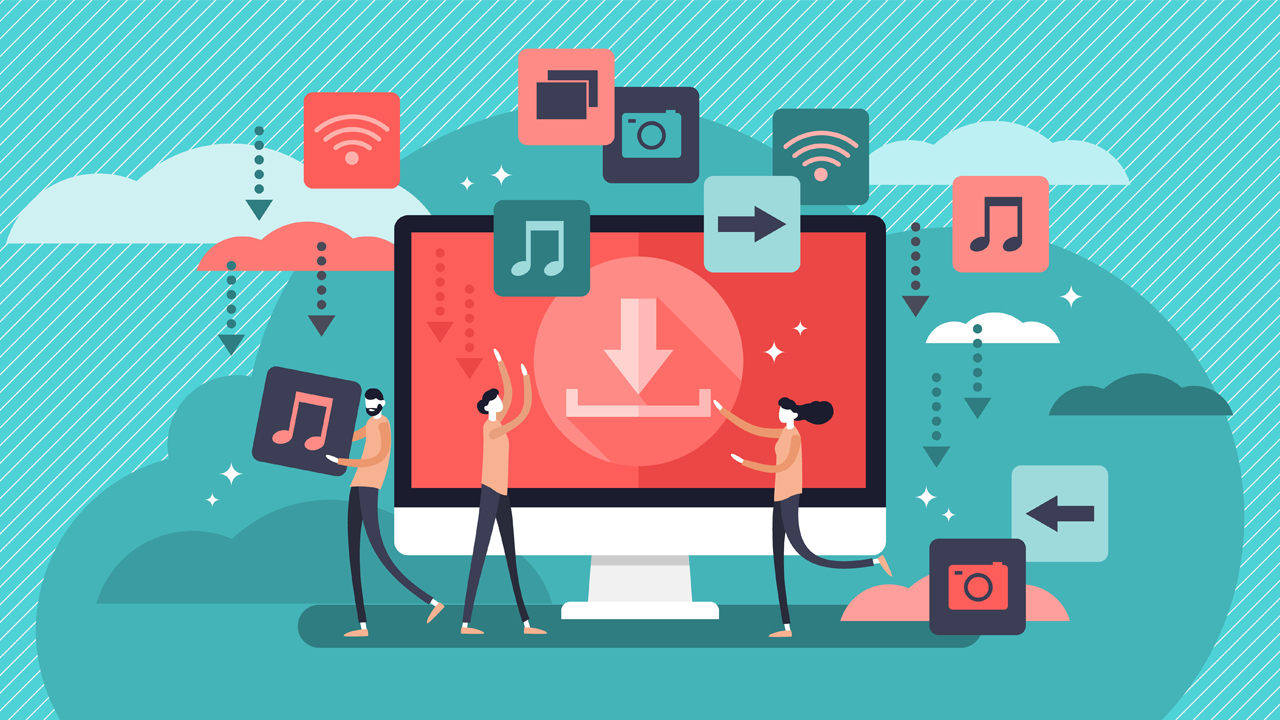How to torrent safely: five ways to reduce the risks of P2P
It's doesn't start and end with using a VPN

One of the most contentious topics on the Internet, torrenting is both a hugely practical way to download large files and a prime mechanism for sharing copyright-infringing content. While we in no way condone using P2P to download illegal material, it’s also no secret that accessing torrents of any kind can put you and your online security at risk.
It's clear that plenty of people already understand that risk, too – in our recent survey, over 25% of users of the best VPN services regularly use them to torrent safely. However, while highly recommended, it doesn't start and end with just using a torrenting VPN.
The risk is all down to how torrents work. Rather than downloading from one file source, the file is decentralized. In simpler terms, that means you’ll be connecting to ‘seeders’ – other individuals who already have the file – rather than a single server that sends the file to you. While this can seriously speed up your downloads, it also exposes your identity to others on the torrent, meaning that they may be able to identify and target you malicious purposes.
So, here we'll run down five of the most important steps to help you torrent safely and keep your identity safe...
- Just in: Over 40% of VPN subscribers use them for streaming – here's why
- PS5 restock update: Track on Twitter, Walmart, Target and more
- They're not great for torrenting, but you can save some cash with a free VPN
1. Always use a VPN
Yes, you might have gathered this already, but using a VPN is just about essential if you want to torrent safely. This is because a secure VPN provides a layer of anonymity between you and the torrent which is useful for more than one reason.
Firstly, a VPN changes your IP address, so anyone who manages to intercept the traffic won’t be able to link that back to you – they’ll just end up at your chosen VPN provider’s server.
A VPN also anonymizes your activity in terms of what your Internet Service Provider (ISP) can detect. Without a VPN, your ISP can tell if you’re torrenting, and then take action – usually in the form of network throttling, which results in drastically slowed connection speeds. However, with a VPN active, all your ISP can see is that you’re using a VPN, so it can’t make the decision to throttle your speeds, or worse, send you a warning that torrenting is against the terms of your contract and threaten to terminate your account.
Finally, many ISPs explicitly block torrent sites. So, even if you’re seeking a legal download, you might not be able to access the search engine necessary for you to find the torrent in the first place. Again, a VPN will unblock these torrent sites, meaning you’re free to make the decision whether to download or not yourself.
If you're in need of a VPN, our top recommendation is ExpressVPN. Every server is P2P-optimized, in our testing it delivered class-leading speeds, and it also offers a 30-day money-back guarantee so you can test the service before you commit. Head to the ExpressVPN website to learn more.
2. Check the comments on the torrent file
If you’re a seasoned torrenter this one should be second nature, but for those just discovering the world of P2P it’s a good tip to highlight.
On just about every torrent aggregator, users can add comments on the download page of each file. If the file is found not to live up to expectations – perhaps not containing what was expected, or even in some cases harboring dangerous malware – users may leave comments verifying the contents, or alerting others that it’s not what it claims to be.
While anonymous online comments should always be taken with a pinch of salt, if there are a number of options for the particular file you’re seeking, it’s well worth checking out what fellow torrenters have to say about them.

3. Use antivirus software
No matter what you think you're downloading, the contents of a torrent could be infected with malware. To save yourself the hassle of cleaning up your device after a virus has made itself at home, taking reasonable precautions and installing one of the best antivirus programs alongside your VPN is a core element of torrenting safely.
If you’re planning on using torrents a lot, we’d highly recommend paying for a premium service, but free antivirus software can do the job if you’re only a casual user – anything is better than nothing!
4. Use a quality torrent client
Unlike many kinds of software, you really can get away with using a free torrent client in the long term, but picking the right one is still essential if you want to torrent safely.
We usually recommend qBittorrent as our top pick, but we also recommend doing some research on which client might suit you best. Some offer tons of extra features, so if you like to get into the guts of the software you’re using that might be a priority. However, top of your shopping list should be a client that’s got a clean history with no security issues.
5. Download from verified or trusted uploaders
Someone has to upload files for the public to torrent, and some individuals have quite the reputation for uploading good quality, sought-after content. These users are often designated as ‘VIP’ or ‘Trusted’ on your chosen torrent site, so if you find what you’re looking for and it’s uploaded by one of these highly rated users, you can be fairly confident that you’ll be getting what you intend.
These torrents also often have a good number of seeders. This not only means that your downloads will be faster, but you can also be more confident that the files are legitimate, thanks to the fact that hundreds or even thousands of people have saved them and chosen to seed for others to download.
How to torrent safely in a nutshell
We'll again reiterate that we do not condone using torrents to download illegal content. That being said, even if you're downloading legal files, you still might be at risk.
The best way to start torrenting safely is by downloading a good torrent client and backing it up with VPN and antivirus software, but these are in no way guarantees that you'll be getting what you're looking for.
Make sure to check the download pages for comments from other users, and ensure that you're downloading a file uploaded by a reputable source. If you use a little common sense and stay extra cautious, you'll almost certainly come out the other end unscathed.
- More: Explore the fastest VPN on the market
- These ad blockers and VPNs are spying on you: What to do

Get instant access to breaking news, the hottest reviews, great deals and helpful tips.

Mo has been rigorously testing, reviewing, and analyzing VPN services at Tom’s Guide for more than five years. He heads up the three-person Tom's Guide VPN team, and is passionate about accessibility: he believes that online privacy should be an option that’s available to everyone. NordVPN and ExpressVPN are the products he uses most on a daily basis, but he experiments weekly with all the top services, evaluating their privacy features, connection speeds across various protocols, and server reliability – among other things – so that he can make confident VPN recommendations that are backed by data. To see his latest advice, head over to Tom’s Guide’s best VPN and best free VPN guides.
